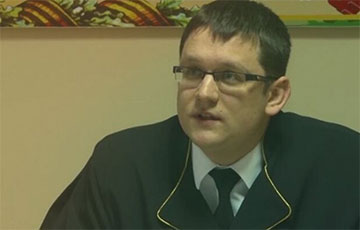How a Pinsk Judge Resigned in Protest
9- 22.10.2020, 16:54
- 21,412

Aliaksei Patsko refused to consider political cases.
Aliaksei Patsko, 32-year-old from Pinsk, spends the morning of Thursday, October 22, at his dacha picking nuts. Yesterday was his last working day as a judge of the Pinsk district and Pinsk city courts. The farewell to his presently former colleagues was calm. Aliaksei made the decision to quit his job in August due to "the general situation and current events." On October 15, Aliaksandr Lukashenka signed the corresponding decree, tut.by writes.
The formal reason for the release of Aliaksei Patsko from the post of judge of the Pinsk District and Pinsk courts is the expiration of a five-year term of office. However, the ex-judge himself does not hide the fact that he decided to leave on August 6 due to the situation in the country. When he informed management of his desire to quit, he was given time to think. Aliaksei did not change his decision - and on August 20, the corresponding documents were drawn up.
- Generally speaking, this [resignation] is connected, of course, with the situation, current events, a feeling of some kind of injustice in general. Together. Although in the recent past, I also attracted people under such articles (I mean "politically motivated" 23.34 Administrative Code - TUT.BY note), - the former judge explains.
Aliaksei still remembers the names of two women who were tried in January this year under Article 23.34 for taking to the streets with posters against deeper integration with Russia. He assigned them fines. Tatstsiana Kebikava - 135 rubles, Liudmila Alekhina - 108 rubles.
- They are brave women, I think. They had a clear position. They immediately said: "We admit our guilt, and we did so because it is so right." At that time, openly admitting beliefs [in court] was unusual. They immediately said that they acted purely within the framework of their ideas. And they, of course, did not consider it correct to hold them accountable for this.
- Is there any difference between those who were tried under 23.34 Administrative Code in January and those who are being tried now?
- I do not think so. No, these are the same people. It was just then that there was a feeling that they were in some kind of overwhelming minority.
- And now?
- Now, there is no such thing. It seems to me that now there is a realization that the one who thinks differently is not one in a thousand. They are "the thousand." And the number of their opponents are much smaller, in fact. You look around, and it turns out that this is not just my problem, that there are many others who think the same about it: that not everything is good, that something needs to be changed, to be better.
"Inside yourself, you can be with any point of view"
Information about Aliaksei's departure quickly spread through networks and telegram channels. It was reported that after the elections, he did not judge people under Article 23.34 of the Administrative Code.
- Any decision has its consequences. You should understand that if you refuse, then with a high degree of probability, some questions may arise for you. (…) I understood this and said that I did not want [to consider cases under 23.34 Administrative Code] and was ready to write a statement. Unfortunately, the judicial system, it seems to me, is another pillar of the vertical of power. You are either in the system or outside the system.
- The judge cannot have an alternative point of view?
- Inside yourself, you can be with any point of view. Nobody demands explicit external support. The support of the system should only be in clear, concrete cases. And what you really think is already your problem. It seems so to me.
- And yet, today the judge decides for himself what punishment to appoint at 23.34? Or is it brought to him "from above"?
- I will not comment on this.
"Here, basically, people work for the idea."
Aliaksei is the father of three small children. But his wife, she says, supported his decision. True, she is still worried about him:
- Specifically about me, and not because I'm leaving. Let no one think that judicial work is easy: you just sit and do nothing. In fact, this is very voluminous, very hard work. The amount of information is monstrous. In small courts, it may be easier, but in the courts of Pinsk, Baranavichy, Maskouski, Leninski districts of Brest, the volumes are big. There are two or three criminal cases a day and 30 administrative cases. The volumes are very large. And given that the judges are not always enough, there is not much time for rest. And salaries are not cosmic. There are no benefits at all. Here, basically, people work for the idea. One that everyone defines for himself.
The former judge is not going to leave the country. At this point, Aliaksei is looking for work. He hopes that he will be able to find a place for himself in the field of jurisprudence.
- Were there any consequences of your decision to leave?
- There were.
- What kind?
- I became unemployed.
- And besides the obvious?
- There weren't yet, and I hope there won't be.
- Do you regret it?
- No, I don't regret it. I made a decision and was ready for the consequences.
After his story hit the Web, Aliaksei, he says, received a flurry of calls with words of support:
- But I'm not a public person. I'm not on social media. So, mostly my acquaintances who have my personal phone number called and wrote.









